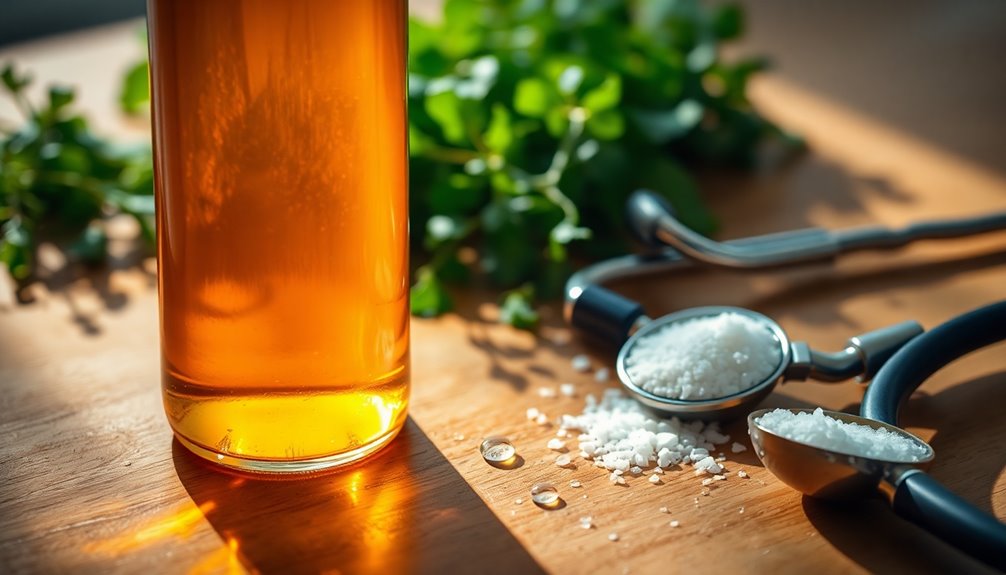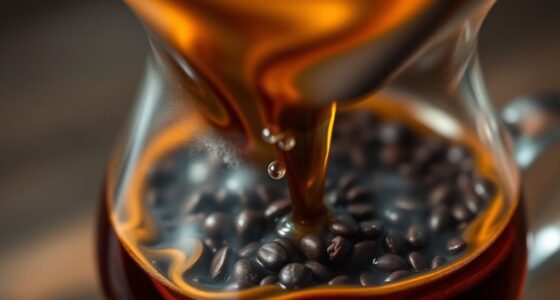If you suffer from acid reflux, the best times to drink coffee are between 9 and 11 am. This timing aligns with your body's natural cortisol levels and can help boost alertness without aggravating symptoms. It's wise to avoid coffee on an empty stomach; instead, consider pairing it with alkaline foods like avocados or yogurt to buffer acidity. You might also explore low-acidity options, like cold brew or darker roasts, which can be gentler on the stomach. By fine-tuning your coffee routine, you'll manage your GERD symptoms better, and there's more valuable advice ahead to enhance your experience.
Key Takeaways
- The ideal time to consume coffee is between 9 am and 11 am, aligning with natural cortisol levels for optimal energy without irritation.
- Waiting at least an hour after meals before drinking coffee helps aid digestion and reduces the risk of reflux symptoms.
- Pair coffee with alkaline or calcium-rich foods to buffer acidity and minimize discomfort while enjoying your beverage.
- Choose low-acidity coffee options like dark roasts or cold brew to reduce the likelihood of triggering GERD symptoms.
- Monitor individual responses to coffee timing and adjust consumption habits to manage GERD effectively.
Morning Coffee Rituals

As you kick off your day with a cup of coffee, you're likely tapping into a cherished morning ritual that boosts your alertness and energy. The caffeine in your morning coffee enhances your energy levels and focus, making it a staple for many.
To optimize its effects, consider enjoying your coffee mid-morning, around 10 am. If you're prone to acid reflux or GERD, pairing your coffee with a balanced breakfast rich in alkaline foods or whole grains can help reduce discomfort.
It's vital to keep tabs on your personal tolerance, as everyone reacts differently to coffee. Your morning routine can be both energizing and mindful, ensuring you start your day on the right note while considering your health needs.
Coffee and Acid Reflux

While coffee is a beloved beverage for many, it can be a double-edged sword for those prone to acid reflux. Drinking coffee may increase stomach acid production and relax the lower esophageal sphincter, potentially worsening your reflux symptoms.
However, individual responses vary; some folks find that small amounts can actually alleviate heartburn when paired with healthy foods. Opting for darker roast coffees or cold brews can help, as they generally have lower acidity and might reduce the risk of reflux.
It's also wise to avoid drinking coffee on an empty stomach, as that could lead to increased discomfort. Pairing your coffee with alkaline foods or calcium-rich items like yogurt can further buffer acidity and mitigate potential GERD issues.
Optimal Timing for Consumption

Finding the right time to enjoy your coffee can greatly impact how your body reacts, especially if you deal with acid reflux. The ideal timing for consumption often falls between 9 am and 11 am, when cortisol levels start to decline, enhancing the stimulating effects of coffee.
You might consider mid-morning coffee around 10 am to boost alertness while minimizing stomach irritation. Avoid consuming coffee on an empty stomach, as this can increase stomach acidity and worsen reflux symptoms.
Instead, wait an hour after meals to allow your stomach to digest food properly. Remember, individual tolerance varies, so monitor your responses to different coffee timings to effectively manage your GERD symptoms.
Food Pairings With Coffee

When you're enjoying your coffee, consider pairing it with alkaline foods like avocados or eggs to help reduce acidity.
Whole grains, such as brown bread or porridge, can also make a great breakfast companion, easing any potential discomfort.
Plus, adding calcium-rich options like milk or yogurt can help neutralize stomach acid, enhancing your coffee experience.
Alkaline Food Benefits
To enjoy your coffee without the discomfort of acid reflux, consider pairing it with alkaline foods that can help neutralize stomach acid. Specific foods and drinks like avocados and eggs can considerably reduce acid reflux symptoms when enjoyed alongside your coffee.
Incorporating calcium-rich foods, such as yogurt or milk, can buffer stomach acid, making your coffee consumption more comfortable. A balanced breakfast that includes these alkaline foods can promote better digestive health and mitigate potential discomfort from coffee. Additionally, understanding the holistic approach to dietary choices can further enhance your overall well-being while managing acid reflux.
Whole Grains Recommendation
Incorporating whole grains into your breakfast routine can greatly enhance your coffee experience while reducing the risk of acid reflux. Whole grains, like brown bread and porridge, provide fiber that aids digestion and helps reduce symptoms associated with coffee's acidity.
Foods such as oatmeal and whole grain cereals aren't only rich in nutrients but also buffer acidity, making them healthy options to pair with your morning coffee. A balanced meal combining whole grains and coffee promotes a steady release of energy, minimizing discomfort.
Plus, whole grains are alkaline-forming in the body, counteracting coffee's acidic nature. By choosing whole grains, you can enjoy your coffee while supporting digestive health and mitigating the chances of acid reflux. Additionally, ensuring a consistent bedtime routine can further promote digestive health and overall well-being.
Calcium-Rich Pairings
Pairing your coffee with calcium-rich foods can greatly enhance your morning routine while helping to counteract potential acid reflux.
Foods like milk and yogurt help neutralize stomach acid, providing relief from discomfort. Including alkaline foods, such as avocados and eggs, can further reduce acidity and improve your digestive comfort.
Whole grains, like brown bread and porridge, also serve as a buffer against acidity when consumed alongside coffee.
By incorporating these calcium-rich pairings into your breakfast, you not only balance the acidity of your beverage but also create a protective effect against potential reflux. Adding healthy fats to your meal can also contribute to a more satisfying breakfast experience.
Enjoying these combinations can make your coffee experience more satisfying while minimizing any adverse effects on your digestive system. To elevate your coffee experience even further, investing in the best coffee makers can make a significant difference. The right coffee maker can enhance the flavors of your coffee and ensure the perfect brewing temperature for a delicious cup every time. Pairing this with the right blend and add-ins can truly take your coffee enjoyment to the next level.
Low-Acidity Coffee Choices

When looking for coffee that's easier on your stomach, low-acidity options can make a significant difference for those with GERD.
For coffee lovers, choosing low-acid coffee like darker roasts and cold brew coffee can help reduce discomfort. Cold brew coffee is particularly beneficial, as it can be up to 70% less acidic than traditional hot brews.
Additionally, medium-altitude coffee beans, grown between 900-1200 meters, offer lower acidity levels, making them a great choice for managing acid reflux.
If you prefer decaffeinated coffee, opt for brands processed using the Mountain water method, which is gentler on the stomach and can effectively help manage GERD symptoms.
These choices can make your daily caffeinated drinks more enjoyable without the worry of flare-ups.
Lifestyle Modifications for Relief

Choosing low-acidity coffee can certainly improve your comfort, but lifestyle modifications also play an essential role in managing GERD symptoms.
Start by focusing on weight loss, as excess weight increases abdominal pressure, worsening acid reflux.
Adopt smaller meals throughout the day, which can help reduce the volume of food in your stomach, easing pressure on the lower esophageal sphincter.
Remember to avoid eating or drinking two hours before bedtime to minimize nighttime reflux.
Elevate the head of your bed to prevent stomach acid from flowing back into your esophagus while you sleep.
Incorporate herbal teas instead of carbonated drinks and limit strenuous activities that may strain your abdomen.
Making these lifestyle changes can greatly reduce your GERD symptoms.
Frequently Asked Questions
What Is the Best Way to Drink Coffee With GERD?
If you're dealing with GERD, start by choosing low-acid coffee options like dark roasts or cold brews.
It’s best to drink your coffee after meals rather than on an empty stomach, as this can help buffer acidity. Drinking coffee on a full stomach can also enhance its flavor and aroma, making for a more enjoyable experience. Additionally, it may help reduce the likelihood of experiencing discomfort such as bloating and coffee digestion tips can be beneficial in optimizing your coffee routine. Experimenting with different brewing methods and coffee types can also play a role in how your body reacts to caffeine after meals.
Pairing it with alkaline or low-acid foods, like avocados, can reduce discomfort.
Finally, pay attention to how your body reacts and consider limiting your intake to one cup a day to manage symptoms.
When Is the Best Time to Drink Coffee to Avoid Acidity?
To avoid acidity, you'll want to time your coffee wisely. Mid-morning, around 10 am, is often ideal, as your cortisol levels start to drop, enhancing caffeine's effects without increasing acidity.
Drinking coffee on an empty stomach can boost stomach acid, so try having it with food, especially alkaline options.
Finally, steer clear of coffee within two hours of bedtime to prevent disrupted sleep and potential discomfort later on.
What Is the Best Morning Drink for Acid Reflux?
When you wake up feeling like a dragon with a fiery belly, the last thing you want is a drink that'll stoke those flames!
For acid reflux, you might want to sip on soothing herbal teas or warm water with lemon instead. These options can cool your stomach and keep discomfort at bay.
Remember, experimenting with different drinks can help you discover what works best for your unique tummy troubles.
Cheers to comfort!
Should I Stop Drinking Coffee if I Have Acid Reflux?
You don't necessarily have to stop drinking coffee if you have acid reflux.
Many people manage to enjoy it without severe issues. It's important to pay attention to how your body reacts.
You might try low-acid coffee or drink it alongside alkaline foods to lessen discomfort.
Consulting a healthcare professional can provide tailored advice.
Ultimately, it's about finding what works best for you while keeping your symptoms in check.
Conclusion
You might think you have to give up coffee entirely if you suffer from GERD, but that's not the case! By choosing low-acidity options and timing your coffee consumption wisely, you can still enjoy your morning ritual without triggering acid reflux. Pairing your coffee with the right foods can also make a difference. So, don't stress—just make a few adjustments, and you can savor your favorite brew while keeping your symptoms in check.










